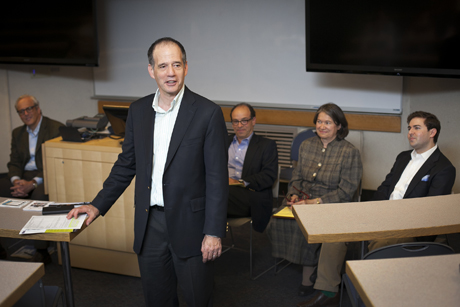Alums offer career paths for history majors
By Kathy Hovis

History majors who wonder what path to pursue after graduation had their eyes opened to the possibilities Oct. 3 as alumni from various career fields shared their experiences at a panel sponsored by the Department of History.
“What You Can Do With a History Major” featured alumni with experience in banking, law, publishing and university administration.
“History majors are not vanilla [ice cream]; they’re more like rocky road,” said Ken Siegel ’78, senior vice president of Loews Corp., adding that history majors have often taken a variety of courses, had a multitude of experiences, and learned how to research and analyze information across varied areas of study.
“In real life, there’s never a clear answer but always conflicting information,” Siegel said. “You have to weigh it and make a decision.”
Margaret Cangilos-Ruiz ’74, a U.S. bankruptcy judge for the northern district of New York in Syracuse, encouraged students to embrace their liberal arts background and challenge themselves with new experiences. “Some of the most difficult challenges for you will prove to be your best experiences,” she said. “They will fit into the tapestry of your life and the stories you weave as you tell others about your life.”
Having an interesting major and thesis project can be an engaging part of your life story for employers, said Eric Blair-Joannou ’10, who is studying for a master’s in urban planning and an MBA at Columbia, after working for the New York City Department of City Planning and J.P. Morgan.
“Even in my banking interviews, my biggest edge was that I was a history major,” he said.
Cliff Manko ’80, vice president of business management for Cengage Learning, said many publishing companies are full of liberal arts majors. He also reassured students that their first job might not be what they end up doing forever. “If you don’t know what you want to do right out of the gate, don’t panic,” he said. “Get some experience, and it will all come together.”
Susan Murphy '73, Cornell’s vice president for student and academic services, said those experiences can be as deep as a summer internship or as brief as a one-day externship.
She remembers job-shadowing her uncle, an advertising executive, thinking she might want to go into that field. One day was all it took to know it wasn’t for her, she said.
“Keep in touch with people who know you, even people for whom you babysat,” Murphy said. “You never know where those connections will lead you.”
Students attending the panel shared the panelists’ passion about their major. Dallas Bennett ’15 of Las Vegas, for example, said he entered Cornell as a biology major, but took several history classes focused on modern warfare and found what he wanted to study. He’s majoring in history, with a minor in law and society.
“Listening to Judge Cangilos-Ruiz expanded my thoughts about what I might do,” said Bennett, who plans to attend law school and perhaps go into international law.
The panel was moderated by Barry Strauss, the Bryce and Edith M. Bowmar Professor in Humanistic Studies and chair of the history department.
Kathy Hovis is a writer for the College of Arts and Sciences.
Media Contact
Get Cornell news delivered right to your inbox.
Subscribe